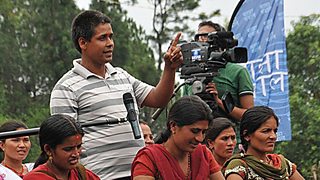Sajha Sawal: a story of success
Narayan Shrestha
Presenter and Senior Producer, Sajha Sawal, Nepal
Tagged with:

Sajha Sawal gives Nepalese the chance to ask questions of their leaders and public figures about issues that matter to them.
I have travelled to 60 out of the 75 districts in Nepal since we launched Sajha Sawal (Common Questions) in 2007. In five years years, the political question and answer show has asked tough questions of over 500 leaders, government officials and public figures, featured approximately 15,000 Nepalis in its studio audiences and reached nearly six million people across Nepal. This Sunday, we will broadcast our 250th episode.
The topics we raise in Sajha Sawal frequently form the agenda of public debate in Nepal. Picked up in the wider press, they are discussed by political leaders and intellectuals. Some programmes have led authorities to take certain key decisions and actions.
But there are certain programmes which have had a strong impact in an individual's life. I remember one such case vividly and my heart fills with satisfaction when I remember it.
It was a bright Saturday morning. I had gone to the barber in my neigbourhood. Unlike on other occasions, he looked shabby and gloomy. I joked, "Why haven't you shaved and trimmed your hair? You're a barber, after all!"
He did not react, except saying briefly that he was very frustrated and depressed. As he played with his scissors around my hair, we began chatting about the issues of the day. During the conversation, the barber erupted in anger, aimed particularly at the police.
He revealed to me that his son had been abducted. He had already received ransom calls demanding amounts way above what he could afford. After informing the police, he had run from pillar to post to try to bring about his son's rescue. But nobody in authority offered any help. He had given up hope that his son was still alive.
It just so happened that the Sajha Sawal team had planned to do a programme on public security the next week. We had invited the then Βι¶ΉΤΌΕΔ Minister, Mr Krishna Sitaula, to appear as one of the panellists. So I encouraged the barber to also come on the programme and tell his story.
The minister was instantly struck by the barber's challenging words: "My son has been missing for two weeks, and police know about it," the barber told him. "But where is your response? Either find my son, or kill me too." The barber was in tears.
The home minister promised to personally look into his case.
A week later, I was running late for an interview at the Sajha Sawal office. As I rushed into the building, I was stopped by a message that there was someone waiting to see me.
When I entered the office, there stood the barber leaning against the wall. Beside him was a boy of about eight. The barber walked towards me with his hands clasped, saying namaste to greet me.
"Sir, you have done me a big favour to me. My son is back." He uttered these words in one breath.
The little boy, only as tall as his father’s waist, looked exhausted and tired. But he looked satisfied and happy. I could not believe this. Seeing the happiness on their faces, I too was overjoyed.
We have done several discussion programmes on grave political issues. The programmes have triggered intensive political debate. But little has changed in Nepal in substantive terms. So at times I get very frustrated.
But when I see one person's life has been changed because of our programme, I feel extremely happy. That is one thing that keeps me going.
Related links
Elsewhere on Βι¶ΉΤΌΕΔ Media Action:
